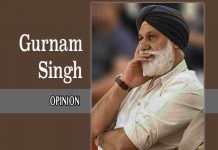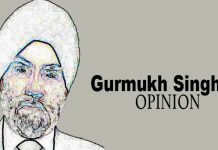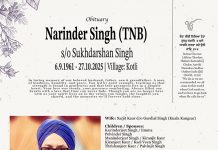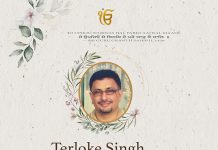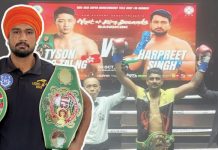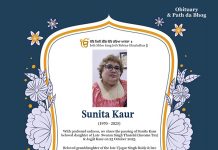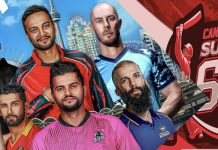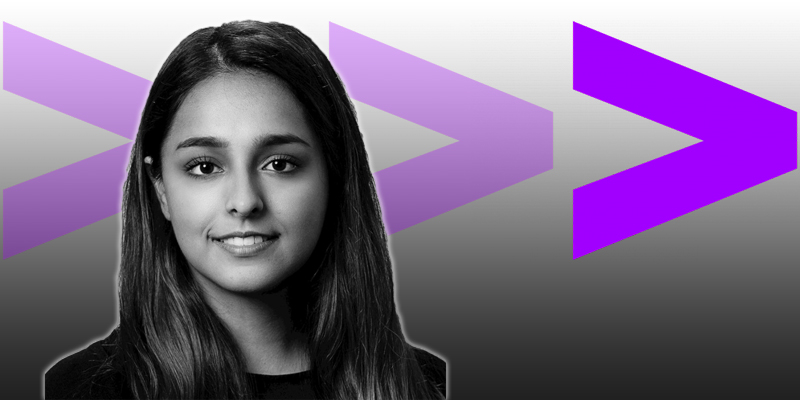
By Anandpreet Kaur | Singapore |
Strategy consultant Ravin Khosa is sure of one thing: she is hopeless at tennis. But she’s not beating herself up about it. In fact, her attention has shifted to the next adventure.
“Usually I experiment a lot through exercise – I picked up yoga and pilates to rehabilitate a few injuries. I also picked up tennis last year but I quickly realised my hand eye coordination was nonexistent when a racket is in the picture,” she tells Asia Samachar.
Ravin, who was promoted as a strategy consultant at Singapore-based Accenture Strategy, has put down her tennis racquet to explore some other exercises. At the moment, with travel out of the picture, she’s working on getting a 100kg deadlift personal best. Silent-disco weightlifting bootcamp has also been jotted in her diary. Quite an explorer.
On her parents, she said they placed a lot of emphasis on giving one’s best shot in whatever one did and striving for a good education. “The ability to define your path on your own terms is a privilege granted to those who are willing to work hard and persevere, regardless of where one’s starting position is. This is one of the biggest lessons I took away from my family,” she said.
The business management graduate from Singapore Management University (SMU) is also active on the volunteer front. She has just completed a project cycle as project adviser with Conjunct Consulting, Southeast Asia’s first social change consultancy, and has been part of the organisation for the past six years.
Excerpts from the interview.
Tell us more about yourself?
I am Ravin Khosa, Singaporean, born and bred!
Tell us more about your family background?
I am the youngest of three children. My father is an engineer and my mum is a homemaker. I have two older brothers; one is in law, and my other brother is in the banking industry. My parents placed a lot of emphasis on giving your best shot in whatever you did and striving for a good education. Working hard and maximising the options you have in order to define your life path on your own terms, is one of the biggest lessons I took away from my family.
You have a BBM in Marketing and Finance from Singapore Management University (SMU). What made you pursue this line of study?
I wanted to pursue a degree that would give me options – be it to explore subject matter in school, or explore different industries or lines of work. I wanted to make a very thought-through decision on what I wanted to do before going all in. If I am entirely honest, before entering university, I thought I was going to end up in marketing in a major FMCG. But I interned at one at the end of year two and realised it wasn’t for me at all.
That was a rude shock and I was already in year three, a year from graduating, wondering where I could go with this. But then I explored around – I enjoyed finance and took up a major in that – again, in the name of flexibility, arriving at what I considered quite balanced coursework. I then found conjunct consulting by chance, and found out about consulting – where I could solve problems for a living and go from cost optimization for an agri-player one day to doing growth strategy proposal work for a shipping firm the next. The brain-pick conjunct consulting gave me doing consulting work for social good organisations entirely sold me and I spent the next 1.5 years doing whatever it took to end up in consulting. And here we are!
You are now a strategy consultant at Accenture. What does the job entail?
Accenture Strategy is positioned as the strategy consulting arm of Accenture targeting C-suites of Fortune 500 companies, shaping points of view on emerging business topics across various industries, and helping Fortune 500 companies mould their strategic agenda and goals, outlining what needs to be done to achieve those business outcomes, and then in some cases, overseeing the actual transformation work as well. Accenture in the last two years has undergone a massive reorganisation to position itself as an end-to-end digital transformation powerhouse – so our role as strategists often involves marrying business and technology which is super fun for me because of the added layer of complexity – and as a tech noob it is an even greater uphill battle.
As a Consultant, I support in proposal development and in project work. In the latter, we develop recommendations, pitch them, and eventually at times, oversee their implementation for the client. In my role, I lead specific workstreams and sets of deliverables, perform analysis and develop our recommendations, and manage some of our client relationships. The next step to work towards is being able to manage consultants across multiple workstreams in a project and play a key role in more senior client discussions, where you would be able to steer your engagements better.
At this stage I am exploring the niche I want to build. I am veering towards doing innovation-related, and front-office transformation work for consumer good companies. This entails helping companies assess how they can grow their sales, optimize marketing spend and more.
You’re also active in various volunteering projects, which one takes up most of your time?
I just completed a project cycle as Project Adviser with Conjunct Consulting. Conjunct Consulting is a pro-bono social consultancy in Singapore, where we train university students across the local universities, SMU, NUS, NTU to be consultants who then go on to help organisations in the social sector in Singapore to achieve their goals. These may be achieving greater financial sustainability, setting up an impact assessment framework for their programmes and more.
The last project I was involved in required the team to set up an impact assessment framework for a local association to assess the impact their programmes have on their beneficiaries. In the next cycle, we will evaluate the impact of the programmes set up by this association and provide them with recommendations to improve their overall impact. As a Project Adviser, I oversee the work and act as a Mentor to guide the project team to achieving the engagement objectives.
What is your advice to younger Sikhs who are looking at pursuing an interest in business management?
I think in anything you pursue, you need to do your own thorough research and build your own network of individuals you want to be like, both from an accomplishment and character/personality perspective. Defining your path is not easy, and should not on the back of someone’s else experience or hearsay or even the “norm”.
What are you passionate about? And what have you done about it?
I thoroughly enjoy learning new and something entirely out of the realm of my current skills. It is important to constantly explore what is out there, not just to learn more, but to remind yourself to not take yourself too seriously, no one starts being good at anything new, and remember we all are a mesh of different hobbies, experiences and therefore perspectives.
Usually I experiment a lot through exercise – I picked up yoga & pilates to rehabilitate a few injuries. I also picked up tennis last year and I realised my hand eye coordination was nonexistent when a racket is in the picture. I am currently getting my 100kg deadlift back in the belt after some injuries and on Sunday, I am checking out a silent-disco weightlifting bootcamp!
On the side, I am very inquisitive about specific companies/organisations and their leaders. Once I get interested, I read just about everything on them. I have read almost every book on Netflix – both on the organisation and its founder, Reed Hastings because I got interested in how they evolved a renting service to being the first streaming service and how in the name of being an innovation company, Reed Hastings has completely transformed the culture of Netflix, implementing policies and organisational structures unheard of anywhere. I also know every single thing that is out there about the British Royal Family because I find how they have kept their reign relevant over the course of British History interesting and we are also approaching a cornerstone that’ll define the future of it.
I am currently investigating Elizabeth Holmes and Theranos so I can appreciate all the articles covering the trial haha.
What are some of the valuable insights you’ve gained when working with Fortune 500 companies?
It has been interesting to me how the different ways companies are organised and reporting lines are set up heavily defines how you devise your plan to win over various stakeholders. Recognising where the power sits, who the CEO relies on for on-the-ground insights, how a client party views their role in your project and how your clients process types of information are all soft skills that are so important in recognising and playing to from day 1. It is not always the best presentation deck that wins or gets the job done – it’s the whole package of who did you approach & when, what did you say, how did they see themselves in this entire engagement.
Culture is also fascinating and such an important factor in defining your client relationships. I am currently doing work for a large consumer good company, and we have engaged people from the Americas, all over Asia, Middle East, Europe, working across many time zones. I always find it amazing working with a Japanese client vs. an American client, and how we need to tweak our presentation styles, use of specific words, greetings, and also small talk.
There’s a lot more, but i think these are very transferable skills that you can take with you everywhere you go.
RELATED STORY:
Anti-money laundering expert joins NomuPay (Asia Samachar, 18 Nov 2021)
ASIA SAMACHAR is an online newspaper for Sikhs / Punjabis in Southeast Asia and beyond.Facebook | WhatsApp +6017-335-1399 | Email: editor@asiasamachar.com | Twitter | Instagram | Obituary announcements, click here









